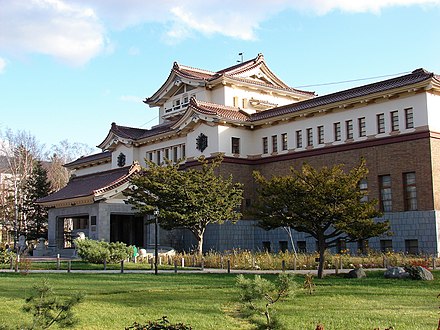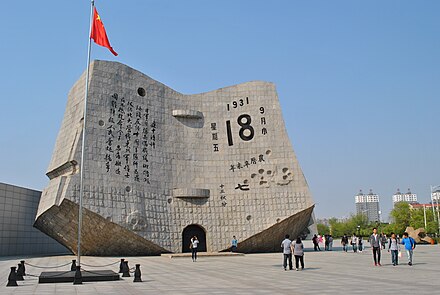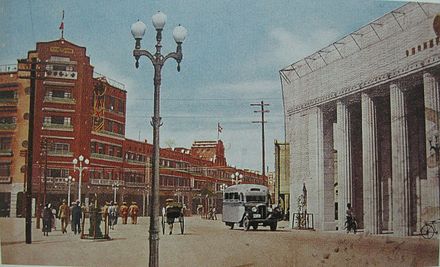Japanese colonial empire - Japanese territorial conquests (1895–1945)
The Japanese colonial empire existed from 1879 to 1945 with a sphere of influence across much of Asia and Oceania.
| | | | Japan historical travel topics:<br>Pre-modern Japan → Japanese colonial empire<br>Japanese castles • Sites of Japan's Meiji Industrial Revolution |
Understand
See also: Pre-modern Japan
After unifying the country at the end of the Warring States Period (1467-1615), the Tokugawa Shogunate adopted an isolationist policy, largely shutting off Japan from the outside world. During this period of Tokugawa rule, known as the Edo Period (1603-1868), Japan was stable domestically, but also stagnated while the West raced forward.
American commodore Matthew Perry brought four warships to Japan in 1853, forcing Japan to end its isolationist policy and open up to trade with the West, with the Japanese unable to resist due to the far superior firepower of the American Navy. Meanwhile, neighboring China, whom the Japanese had long looked up to and been culturally influenced by, was being picked apart by the Western powers, starting with their defeat at the hands of the British in the First Opium War in 1842. These events would eventually culminate in Tokugawa Yoshinobu, the last Tokugawa shogun, handing power back to the Emperor Meiji in 1868, in what is dubbed the Meiji Restoration. However, in practice a "Meiji oligarchy" surrounding the Emperor made virtually all important political decisions. Following the Meiji Restoration, Japan turned away from China and instead looked to the West for inspiration, adopting Western models, philosophies and culture in an attempt to modernize.
1868 to 1912 marked the Meiji Era in Japan, when the country transformed itself from an isolated, feudal society to a modern, industrial nation-state and an emerging great power, becoming the first non-Western country to industrialize. In the 1870s, Japan dispatched missions to the United States and Europe to renegotiate the unequal treaties with these countries, and study the political, technological and military structure of Western nations. To this day, some aspects of Japanese law and culture are influenced by this period. Erstwhile libertine opinions on sexuality were influenced by Western prudishness of the 19th century and the Japanese civil law system is to a large extent based on the German BGB. It was also during this period that Western culinary techniques and ingredients entered the Japanese repertoire, leaving an indelible impact on Japanese cuisine. Japan abandoned the traditional Chinese calendar in 1873, and has since celebrated its traditional festivals according to the Gregorian calendar. Colonialism was also introduced to Japan from the West, with Japan successfully building a colonial empire based on Western models, which is what this article will focus on.
Japan's expansion began with the annexation of the island of Ezo in 1869, which was renamed to Hokkaido. Prior to that, it had regarded as foreign territory that was not part of any country, and was primarily inhabited by the indigenous Ainu people, with small pockets of Japanese settlement in the south of the island. Following the annexation, the Meiji government instituted a policy of settler colonialism in Hokkaido, resulting in large scale Japanese settlement of the island, dispossessing the Ainu of their traditional land and forcing the Ainu to assimilate into Japanese culture. The Ryukyu Kingdom, then a Chinese protectorate, was then annexed in 1879, and renamed to Okinawa prefecture. By then, the Chinese were powerless to defend their protectorate and were only able to call for mediation by the British, who sided with Japan in the dispute. Japan then defeated China in the Sino-Japanese War in 1895, resulting in Taiwan and the Liaodong Peninsula being ceded to Japan, and China being forced to give up its influence over its vassal state Korea, which would swiftly fall under Japanese influence. However, Japan's colonization of the Liaodong Peninsula would be short-lived, as it would be ceded to the Russians after barely a few days. Japan would subsequently win the Liaodong Peninsula back in the 1904-1905 Russo-Japanese War, the first time in centuries that an Asian power defeated a Western one, which also resulted in the southern half of Sakhalin being ceded to Japan as Karafuto prefecture. Japan would then proceed to annex Korea outright in 1910.
After the death of Emperor Meiji in 1912, the Taisho period, sometimes called "Taisho democracy" followed. The old oligarchy lost a lot of power with the Imperial Diet taking over, seemingly transforming Japan into a Western-aligned constitutional monarchy. However, when the sickly emperor died, the Showa period began (the periods are also the posthumous names of emperors; in Japan those are the only names emperors are ever referred to with the reigning tenno being just called "the emperor" — Western usage has diverged from this beginning with Showa/Hirohito). Power shifted to military elites and ultimately culminated in a quasi-fascistic regime. This era of Japanese hypernationalism and militarism often saw various branches of the armed forces vie for power, and sometimes individual commanders even launched unauthorized attacks, forcing higher-ups to react to the "facts on the ground". Ultimately this brought Japan into conflict with the U.S. which turned to open warfare with the bombing of Pearl Harbor.
Japan was one of the victorious Allies in World War I, thus allowing it to further expand its colonial empire by taking over the colonies of the defeated Germans in Asia and Oceania, resulting in Palau, the Marshall Islands, what are now the Federated States of Micronesia and Northern Mariana Islands becoming Japanese colonies. The Shandong peninsula, previously a German concession in China, was also handed over to Japan despite the Western Allies having promised to return it to China, and protests from the Chinese delegation.
Japan would then stage the Mukden Incident in 1931, using it as a pretext to occupy Manchuria, where they set up a puppet state known as Manchukuo, with Puyi, the last emperor of the Qing Dynasty, being installed as emperor. Japan then proceeded to invade the Chinese heartland in 1937, beginning the Second Sino-Japanese War, and were swiftly able to occupy much of eastern China. The Second Sino-Japanese War would merge into World War II following the bombing of Pearl Harbor in 1941, with the Japanese beginning their invasion of British Hong Kong and the Western colonial possessions in Southeast Asia shortly after. During the course of the war, Japan managed to occupy virtually all of Southeast Asia except Thailand (which gave the Japanese full access to their country in exchange for nominal control over the northern Malay states of Perlis, Kedah, Kelantan and Terengganu), and parts of Oceania.
The emperor finally asserted himself in 1945 following the atomic bomb attacks on Hiroshima and Nagasaki, when he overruled a deadlocked cabinet and decided — in an unprecedented move — to give a radio address directly to his people announcing Japan's surrender. Subsequently, the Americans left the empire (and Hirohito as the emperor) in place, albeit with a new pacifist constitution that explicitly grants the emperor no powers whatsoever, and forbids Japan from establishing a military (though the modern-day Japan Self-Defense Forces is one of the world's most powerful de facto militaries).
The Japanese colonial empire ended with the unconditional surrender of Japan at the end of World War II, as the Allies forced Japan to give up all its colonies. In some countries, Japanese remains were demolished due to the decolonization effort. The Japanese General Government Building in Seoul, for example, was demolished by order of South Korean president Kim Young-sam in 1996. However, in Taiwan, the remaining Japanese colonial buildings are now protected by preservation laws, and the legacy of Japanese colonial rule is seen by most Taiwanese as an important part of their heritage.
Today Japan's relationship with its colonial past and the crimes committed by the Japanese military during the colonial era but especially the Pacific War is a difficult one. Unlike Germany whose officials have engaged in a apologetic stance (perhaps most emblematically symbolized by former exile and anti-Nazi Willy Brandt kneeling in front of the Warsaw ghetto memorial while on a state visit as chancellor), Japan has found it difficult to apologize for the wrongs done and to offer some form of restitution, and this has in turn caused diplomatic tensions between Japan and other Asian countries, in particular its neighbors China and South Korea. The sole exception is Taiwan, in which Japanese colonial rule is generally regarded positively, and most locals are proud of their Japanese colonial heritage.
The situation is further complicated by geopolitics as Japan was a strong anti-communist U.S. ally throughout the Cold War and could thus justify its hardline opposition to North Korea and China as "anti-communism" rather than a continuance of pre-1945 political trends. Even today, Japan is seen as a valuable U.S. ally in the ongoing geopolitical contest with China. Japan still does not recognize the de facto border with Russia because the Soviet Union and its successor states never signed an official peace treaty with Japan.
Destinations
China
- Nanking Shrine (南京神社), 32.0501067917°, 118.7705944341°. One of the very few surviving Shinto shrines built under Japanese occupation in mainland China. While the original exterior is largely preserved, the building has since been repurposed, and the interior thoroughly renovated.
- Weifang. In 1914, following the outbreak of World War I, the Japanese occupied the city's German concession and turned it into a Japanese concession. It remained in Japanese hands until the end of World War II. Today the area is a tourist attraction known as Fangzi Eurotown. There are around 166 colonial era buildings, including 103 German-built buildings and 63 Japanese-built buildings. 2022-10-16
Manchuria/Northeast China
- Changchun. Formerly capital of the Japanese puppet state of Manchukuo, it has several former government buildings from that period, in Japanese Art Deco style. 2020-04-23
- Dalian. Zhongshan Square (known as Nikolay II Plaza (Николаевская площадь) under Russian rule, and Ōhiroba (大広場) under Japanese rule) is particularly known for the high concentration of Japanese colonial buildings surrounding the square. 2023-01-23
- Tonghua. 2020-04-23
- Shenyang. The capital of Liaoning province, also known as Mukden in the Manchu language. It was here that Japan staged the Mukden Incident in 1931, using it as a pretext to occupy Manchuria. The 9.18 Memorial Museum commemorates the Mukden Incident, and is located next to the site where it occurred. 2020-12-30
Japan
- Meiji Shrine (明治神宮 Meiji Jingū), 35.676111°, 139.699167°. Shinto shrine built to house the spirit of Emperor Meiji, who took power back from the Tokugawa Shoguns, and oversaw the industrialization of Japan and its rapid rise to major world power status. The Japanese colonial empire also began under him, with the annexation of Okinawa in 1879, followed by Taiwan in 1895 and Korea in 1910. Also a popular and less controversial alternative to the Yasukuni Shrine for Japanese politicians to offer prayers at. Free
Taiwan
Taiwan is the only place in which Japanese colonial rule is generally regarded positively by the locals, though there are some exceptions. Most Taiwanese are proud of their Japanese colonial heritage, and continue to admire Japan and its culture to this day. As such, there are many tourist attractions in Taiwan that capitalize on the theme of colonial nostalgia, and modern Taiwanese culture continues to be heavily influenced by that of Japan.
- 1895 Baguashan Anti-Japanese Martyrs' Museum (1895八卦山抗日保台史蹟館), 24.078522°, 120.545746°. A museum about the Battle of Baguashan, the pivotal battle of the 1895 Japanese invasion of Taiwan. 2019-06-05
- Jinguashi. A gold mining town during the years of Japanese colonial rule, the mines have since been depleted and converted to an open air museum. The mining area is also home to the ruins of a Shinto shrine built during the colonial era that you can hike to. 2022-04-05
- Taipei, 25.066667°, 121.516667°. Taiwan's current capital was also the capital during the Japanese colonial period, with many surviving relics from that era. Perhaps the most famous is the Presidential Office Building, which was the office of the Governor-General during the Japanese colonial period. Although not as well-known as their Korean counterparts, the Japanese also forced many Taiwanese women to become "comfort women", sex slaves in Japanese military brothels, and the Ama Museum is dedicated to their memory. 2020-12-29
- Tainan, 22.983333°, 120.183333°. Taiwan's oldest city is also home to a large number of well-preserved buildings from the Japanese colonial era. Perhaps the most famous of them is the Hayashi Department Store, Taiwan's oldest department store that also had its first ever elevator. The Shinto shrine at the top of the building has also been preserved. Just across the street from the Hayashi Department Store is the Land Bank of Taiwan, Tainan Branch, which was originally built by the Japanese as the Tainan branch of Nippon Kangyo Bank. 2020-06-17
- Wushe Incident Memorial Park (霧社事件紀念公園), 24.020444°, 121.132611°. A memorial erected to commemorate members of the Seediq indigenous ethnic group who were massacred by the Japanese colonial government in the 1930s.
Korea
Although post-independence Korean governments have gradually dismantled Japanese colonial buildings in a effort to have a clean break from what is a very painful period for many, several still survive in various Korean cities.
- Seoul, 37.56°, 126.99°. Although the Japanese General Government Building was demolished in 1995, several Japanese-era buildings survive around Seoul. Some of the more notable ones include the Seoul Railway Station, the Bank of Korea Money Museum and the Seoul Metropolitan Library. There is also the Seodaemun Prison, which was built by the Japanese to imprison and torture Korean independence activists, and has today been converted to a museum commemorating the victims of Japanese colonial rule. 2021-07-10
Sakhalin

- Yuzhno-Sakhalinsk, 46.966667°, 142.733333°. Known as Toyohara (豊原) under Japanese rule, it was the capital of what was then Karafuto (樺太) prefecture, today known as Sakhalin. Among the few surviving Japanese colonial buildings is the Yuzhno-Sakhalinsk Museum and the former Hokkaido Takushoku Bank Building. 2020-12-28
Palau
Marshall Islands
Federated States of Micronesia
Northern Mariana Islands
Respect
The Japanese occupation is a sensitive subject in many of its former colonies, especially in China and South Korea; tread carefully when discussing it with locals. The sole exception is Taiwan, in which Japanese colonial rule is generally regarded positively, and most locals are proud of their Japanese colonial heritage.
See also
- Sites of Japan's Meiji Industrial Revolution
- Pacific War
- World War II in China
- Pre-modern Japan
- Minority cultures of Japan

